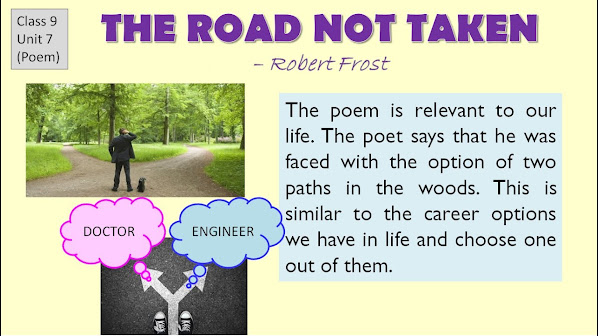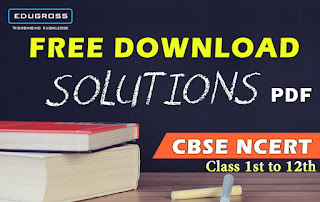Read the extracts and answer the following questions:
- Two roads diverged in a yellow wood,
And sorry I could not travel both
Questions.
(i) Where is the poet standing at this moment?
(ii) Why does the poet feel sorry?
(iii) Where do the two roads diverge?
(iv) Name the poem and the poet.
Answers
(i) The poet is standing at a junction in a yellow forest where two roads are separated in two different directions.
(ii) The poet feels sorry because he is unable to travel on both roads.
(iii) The two roads diverged in yellow wood.
(iv) The poem is “The Road Not Taken’ and it is written by Robert Frost.
- And be one traveller, long I stood
And looked down one as far as I could
To where it bent in the undergrowth;
Questions
(i) How does the poet feel being the lonely traveller?
(ii) Why does the poet stand there for a long time?
(iii) What is he looking at?
(iv) Where does the road disappear from his eyes?
Answers
(i) The poet feels sorry for being the lonely traveller.
(ii) The poet stands there for a long time to decide on which road he should choose to travel on.
(iii) He is looking at the road down as far as he could.
(iv) The road disappears from his eyes in bushes and low trees.
- Then took the other, just as fair,
And having perhaps the better claim,
Because it was grassy and wanted wear,
Questions
(i) Which road does the poet eventually choose?
(ii) Why does he choose it?
(iii) Explain the phrase “as just as fair.
(iv) Explain the phrase “grassy and wanted wear.
Answers
(i) The poet eventually chooses the other road which is less travelled.
(ii) He chooses this road because it is still grassy and has not worn off due to the walking of the traveller.
(iii) The phrase “as just as fair’ here means that the road is exactly the same and equally beautiful a the first one.
(iv) The second road is “grassy and wanted to wear a means the second road was grassy because it had not worn off due to the walking off the travellers.
- And both that morning equally lay
In leaves no step had trodden black.
Questions
(i) What does the word “both’ refer to here?
(ii) What were they covered with?
(iii) What had not been blackened?
(iv) Who would blacken them and how?
Answers
(i) The word ‘both’ here refers to both the roads.
(ii) They were covered with fallen leaves.
(iii) The leaves had not been blackened.
(iv) The travellers would blacken them by their steps.
- Oh, I kept the first for another day!
Yet knowing how way leads on to way,
I doubted if I should ever come back.
Questions
(i) Why did the poet leave the first road?
(ii) What do the two roads represent?
(iii) What was the poet aware of?
(iv) What doubt harboured in the mind of the poet?
Answers
(i) The poet left the first road thinking that he would use it on some other day.
(ii) The two roads represent two different options in life.
(iii) The poet was aware of how one way leads to another.
(iv) The poet would go so far on the first road that he doubted if he would ever come back to walk on another one.
- I shall be telling this with a sigh
Somewhere ages and ages hence,
Questions
(i) Is the poet happy with his choice?
(ii) What does the word ‘this’ refer to here?
(iii) What will the poet be telling with a sigh?
(iv) Explain ages and ages hence.
Answers
(i) No, the poet is not happy with his choice.
(ii) Here the word “this refers to the poet’s choice of the road.
(iii) The poet will be telling with a sigh about the options that he has chosen.
(iv) The phrase “ages and ages hence’ means many many years from now onwards.
TYPE II: SHORT ANSWER QUESTIONS (30-40 WORDS EACH)
Answer the following questions:
- Where does the traveller find himself? What problem does he face?
Ans. The traveller finds himself at a point where two roads diverge. His problem is to decide on which road he should walk.
- Discuss what these phrases mean to you.
(i) a yellow wood
(ii) it was grassy and wanted wear
(iii) the passing there
(iv) leaves no step had trodden black.
(v) how way leads on to way
Ans. (i) A forest in the autumn season.
(ii) The road was grassy because it was a less travelled road. It wanted people to move on it.
(iii) It implies walking on the road.
(iv) It means the leaves had not been crushed under the feet of travellers.
(v) How one road leads to another.
- Is there any difference between the two roads as the poet describes them?
(i) in stanzas two and three?
(ii) in the last two lines of the poem?
Ans. (i) There is no difference between the two roads in stanzas two and three.
(ii) In the last two lines of the poem the poet tells that the road he opted for is less travelled.
- What do you think the last two lines of the poem mean? (Looking back, does the poet regret his choice or accept it?)
Ans. The last two lines have the quintessence of the poem. The poet expresses his opinion that it becomes difficult for a normal human being to change his/her decision. He intends to walk on the first road but he couldn’t do so because life does not offer multiple chances to choose. The decision taken may mar one’s future or lead one to success It makes all the differences. He now repents for not getting a chance to travel on the first road.
- What was the poet’s dilemma?
Ans. The poet was standing before the two roads. He was to decide which one would lead him to success. It was not easy for him to decide. So he stood there and introspected.
TYPE III: LONG ANSWER QUESTIONS (100-150 WORDS EACH)
Answer the following questions:
- Have you ever had to make a difficult choice (or do you think you will have difficult choices to make)? How will you make the choice (for what reasons)?
Ans. Such situations occur in everyone’s life. In today’s world, people have numerous alternatives. But the decision should be taken after considering all the ins and outs of the situation. We must ruminate over the disadvantages also.
(Students can write their own experiences)
- After you have made a choice do you always think about what might have been, or do you accept the reality?
Ans. One should live in the present and not in the past. The philosophy of is’ is the key to attaining success. Life is not a bed of roses. Its hurdles are to be crossed bravely. One must not feel nervous and get dejected in trying circumstances. In some instances, one needs to be confident about the choice he/she makes.
- Making the right choice in life is a very difficult task. Do you agree? Give your answer with reference to the poem The Road Not Taken.
Ans. There is no denying the fact that making the right choice in life is a difficult task. So while making any major choice we should be very careful. We should not make the choice in a haste. As once we select a wrong choice and start working on it, it does not yield a good result as per our hard work and then we repent over our choice but till then it is too late The poet in the poem has reached a turning point I where he has to choose a road. He opts for a road that is less travelled by and leaves the first for another day. But he is doubtful if he has opted for the right choice.
He thinks, if his choice is wrong, after many many years, he would repent for this choice and tell this to people with a sigh.
- What is the dilemma of the poet in The Road Not Taken? How does Frost use the fork in the road as t a metaphor for the choices we make in life? How does he resolve this dilemma and with what result? Had you been in place of the poet, would you have? chosen the same road as chosen by the poet? If not, give reasons for your choice.
Ans. Robert Frost’s poem “The Road Not Taken is about the choices that one makes in life. In the poem, Frost uses the fork in the road as a metaphor for the choices we make in our lives. How our lives will shape much depends on what option, and what direction we choose in life. The dilemma before the poet is how to make the right choice. Two roads are separating in a yellow forest. Both are equally fair. The poet sees the first road as far as it goes and assesses the situation. Then he turns to the second road as fair as the first one. But the second road is less travelled. The poet resolves the dilemma by choosing the road which is less travelled by. He keeps the first road for another day. He knows that it becomes impossible to come back to the road one has left for another day. Frost himself chose the risky and unconventional profession of becoming a poet. Perhaps he was not happy about making his choice. Perhaps the road that was not taken would have proved more rewarding But once the choice is made it becomes irrevocable. And this choice has made all the difference in life, Being a man of adventurous nature. I would like to follow the unconventional path like the poet.
- The poet will be telling “this with a sigh” that he took the road less travelled by’ and ‘that has made all the difference. What is the difference that he poet mentions? Do you believe in making choices that are less “risky and acceptable or the ones that are adventurous, ambitious and unconventional? Give reasons for your choice.
Ans. The poet resolved the dilemma of making a choice. He chose the road that was less travelled by. Here, the two roads represent two options, two alternatives, two ways and two directions of life The poet left the more acceptable and convenient road thinking that he would walk on it on another day. Though he doubted that once followed a path it would become impossible for him to come back to the one he had left. The poet had options to follow the road that led to prosperity, fame and money It could have been a less risky and acceptable conventional option. But he chose to be a poet. His choice made all the difference in his life. Perhaps the road he had not taken would have proved more rewarding. Perhaps other professions would have proved more fruitful. The poet would regret it but without any redressal. The choice had been made and was irrevocable.
I believe in making choices that are adventurous, ambitious and unconventional. The reason is simple. I am young and full of vigour. I like to come across new challenges in life.
QUESTIONS FOR PRACTICE
- What is the dilemma of the poet?
- How does the poet resolve the dilemma?
- Explain ‘I shall be telling this with a sigh.
- Do you think the poet has made the right choice? Why/Why not?
- Why does the poet feel deep regret over his choice?




Comments
Post a Comment